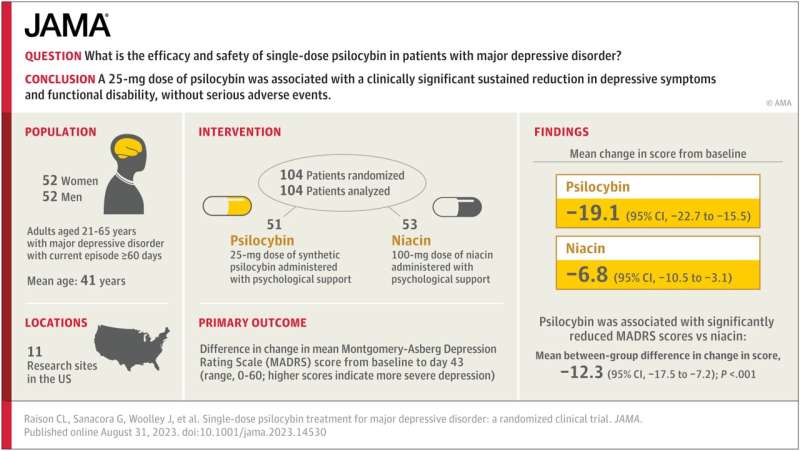
A collaboration between 34 researchers at 18 institutions has looked into the efficacy and safety of psilocybin in patients with major depressive disorder.
In a paper, “Single-Dose Psilocybin Treatment for Major Depressive Disorder: A Randomized Clinical Trial,” published in JAMA, the team finds a rapid onset of antidepressant effects, sustained reduction in depressive symptoms, and improvement in psychosocial functioning associated with a single 25mg dose of psilocybin administered with psychological support in patients with major depressive disorder (MDD).
A randomized, double-blind, placebo-controlled, phase 2 trial was conducted at 11 research sites in the US between December 2019 and June 2022. It involved 104 adults diagnosed with MDD with moderate or greater symptom severity.
Participants received either a single 25mg dose of psilocybin or a 100mg dose of niacin (placebo control) alongside psychological support. Primary and secondary outcomes were assessed at various time points up to 43 days after dosing.
Psilocybin treatment was associated with a significant reduction in Montgomery-Asberg Depression Rating Scale (MADRS) scores compared to niacin from baseline to day eight and baseline to day 43. MADRS is a 10-item assessment for evaluating symptoms of depression addressing core mood symptoms such as sadness, tension, lassitude, pessimistic thinking and suicidal thoughts.
Psilocybin treatment also significantly reduced Sheehan Disability Scale (SDS) scores compared to niacin from baseline to day 43. The SDS scale generates scores related to work disability, social life disability and family life disability.
Exploratory outcomes included scores on the Clinical Global Impressions Scale, Hamilton Anxiety Rating Scale, Quality of Life Enjoyment and Satisfaction Questionnaire, Symptoms of Major Depressive Disorder Scale, and the Oxford Depression Questionnaire (to assess emotional blunting).
The study found that psilocybin treatment was associated with improvements in these exploratory outcomes, including reductions in global disease severity, self-reported depressive and anxiety symptoms, and improved quality of life. Psilocybin treatment did not lead to emotional blunting, often a side effect of standard antidepressant medications.
The study suggests that psilocybin treatment positively impacted various aspects of mental health and well-being beyond just reducing depressive symptoms, as it improved overall functioning, anxiety symptoms, and quality of life in the study participants.
The unmet need of antidepressants
Currently prescribed antidepressants do not achieve symptom remission in one-third of patients with MDD. For the two-thirds that find a treatment effective, the antidepressant response can take months to manifest, and the average relapse rate within a year of remission is over 50%.
This stochastic effectiveness rate often leads clinicians to prescribe multiple different drugs over time in search of a lasting response. This strategy inadvertently exposes patients to adjustment periods to new medications and withdrawal symptoms from previous treatment attempts.
Most antidepressants are associated with an increased reporting of withdrawal syndrome compared with other drug classes. Discontinuing antidepressants, even if ineffective, can have severe and debilitating withdrawal symptoms, including dizziness, nausea, paresthesia, headache, feeling abnormal, anxiety, suicidal ideation, insomnia and depression.
Why psilocybin?
Several studies in recent years have suggested that psilocybin causes a rapid antidepressant response that far outlasts the presence of the drug in the body and an absence of withdrawal symptoms.
Most recent studies have been performed as preliminary trials and require substantiation by a more robust experimental design and larger cohort size. The current study was designed to address these issues using a larger sample size in a randomized, multi-blinded design that compared a single dose of psilocybin with an active placebo comparator (niacin). Blinded raters conducted outcome assessments to examine the timing of onset of action, durability of benefit, and safety profile of psilocybin over six weeks.
The current study confirms past effectiveness findings and reported no serious treatment-emergent adverse events. These discoveries contribute to the growing body of evidence suggesting psilocybin as a potential intervention for MDD.
More information:
Charles L. Raison et al, Single-Dose Psilocybin Treatment for Major Depressive Disorder, JAMA (2023). DOI: 10.1001/jama.2023.14530
Rachel Yehuda et al, Psychedelic Therapy—A New Paradigm of Care for Mental Health, JAMA (2023). DOI: 10.1001/jama.2023.12900
Journal information:
Journal of the American Medical Association
Source: Read Full Article
